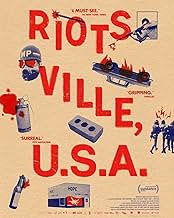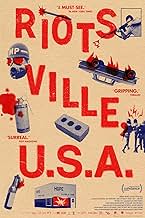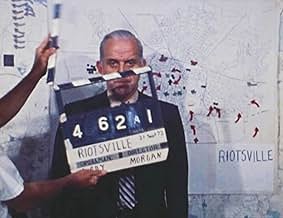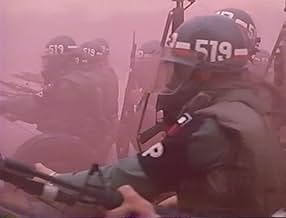Welcome to Riotsville, a fictional town built by the US military. Using all archival footage, the film explores the militarization of the police and creates a counter-narrative to the nation... Read allWelcome to Riotsville, a fictional town built by the US military. Using all archival footage, the film explores the militarization of the police and creates a counter-narrative to the nation's reaction to the uprisings of the late '60s.Welcome to Riotsville, a fictional town built by the US military. Using all archival footage, the film explores the militarization of the police and creates a counter-narrative to the nation's reaction to the uprisings of the late '60s.
- Awards
- 4 wins & 10 nominations total
Charlene Modeste
- Voiceover
- (voice)
Lyndon B. Johnson
- Self
- (archive footage)
Otto Kerner
- Self - Chairman
- (archive footage)
- (as Governor Otto Kerner)
Edward P. Morgan
- Self - PBL Chief Correspondent
- (archive footage)
Robert Curvin
- Self - Former Chairman, Neward CORE
- (archive footage)
Leonard Kowalewski
- Self - Newark Police
- (archive footage)
John Harrington
- Self - Fraternal Order of Police
- (archive footage)
- (as Sgt. John Harrington)
Albert Cleage
- Self
- (archive footage)
- (as The Rev. Albert Cleage)
Alvin F. Poussaint
- Self - Tufts University
- (archive footage)
- (as Dr. Albert Poussaint)
Fred Harris
- Self - Commission Member
- (archive footage)
- (as Sen. Fred R Harris)
Dick Gregory
- Self
- (archive footage)
Roger Mudd
- Self
- (archive footage)
Robert Byrd
- Self
- (archive sound)
- (as Senator Robert Byrd)
Jimmy Collier
- Self
- (archive footage)
Frederick Douglass Kirkpatrick
- Self
- (archive footage)
- (as Rev. Frederick Douglass Kirkpatrick)
Ronald Reagan
- Self
- (archive footage)
Spiro Agnew
- Self
- (archive footage)
- (as Gov. Spiro Agnew)
Strom Thurmond
- Self
- (archive footage)
- (as Sen. Strom Thurmond)
- Director
- Writer
- All cast & crew
- Production, box office & more at IMDbPro
Featured reviews
But this was far below what i expected from a historical perspective. Its the black and white stigmata over and over again, and what really should be delved with, namely how antiriot enforcement where thought to be and how it came to be in the name of riotsville usa drowns in a claustrophobic, cataclysmic psychedelic epileptic triggering lightshows and overfocused still, and a neoneoneoultra composed musical scored( like norwegian composer arne nordheim) makes this a complete rotten mess historywise. Its narrative voice never tells how much was spended or how large this antiriotforce buildup was, and the real riots that couldve made this documentary a real document of history lacks completely.
So if this is how riots have been handled over the years then its time to look somewhere else. As a filmproduct it lacks quality on most bases, and the amount of positive criticism over a ribbed and untelling way to tell a story that has been told here really feels fictitious. The grumpy old man doesnt recommend this one, and will cry out a call to the big documentarymakers to make a series about the real rioting 60's and the real face of the crammed crow.
So if this is how riots have been handled over the years then its time to look somewhere else. As a filmproduct it lacks quality on most bases, and the amount of positive criticism over a ribbed and untelling way to tell a story that has been told here really feels fictitious. The grumpy old man doesnt recommend this one, and will cry out a call to the big documentarymakers to make a series about the real rioting 60's and the real face of the crammed crow.
An in depth review of the true nature of police escalation during civil unrest. All of which is remains painfully relevant even to this day.
I was able to view this during the virtual Sundance Festival.
The blatant and heavily institutionalized discrimination that exists from of birth of police is well displayed throughout this film.
It's unfortunate that this is still a problem today.
Only critique is the editing did feel a bit choppy intermixed with the quotes. Maybe could use another round of editing before wide distribution.
I was able to view this during the virtual Sundance Festival.
The blatant and heavily institutionalized discrimination that exists from of birth of police is well displayed throughout this film.
It's unfortunate that this is still a problem today.
Only critique is the editing did feel a bit choppy intermixed with the quotes. Maybe could use another round of editing before wide distribution.
I was excited to see this documentary when I first heard about it and sought it out, but in the end it left me bored and annoyed.
The director has access to some remarkable file footage, but doesn't seem to know what to do with it. Interspersed with that amazing footage are a series of overly arty flashing collages of ambient video (a close up of TV pixels for several minutes) coupled with grinding tuneless soundscapes and a laughable voice over that sounds like a cross between a bad poetry slam and a hilarious satire of an overly earnest podcast, right down to the slow, labored delivery and over-pronunciation (Think the "You Must Remember This" podcast)
The director also made a weird choice to not have voice narration outside of the arty collages; instead she has chosen like a hundred title cards in black rectangles in the middle of the screen. It becomes annoying pretty quickly since the file footage is so jaw droppingly interesting.
So many bad choices directorially. With the footage they had, this should have been a gimme, instead it's like a high school film students senior project with a fairly dumbed-down historical take.
Come for file footage; be prepared to fast forward through the long, boring "podcast" segments.
The director has access to some remarkable file footage, but doesn't seem to know what to do with it. Interspersed with that amazing footage are a series of overly arty flashing collages of ambient video (a close up of TV pixels for several minutes) coupled with grinding tuneless soundscapes and a laughable voice over that sounds like a cross between a bad poetry slam and a hilarious satire of an overly earnest podcast, right down to the slow, labored delivery and over-pronunciation (Think the "You Must Remember This" podcast)
The director also made a weird choice to not have voice narration outside of the arty collages; instead she has chosen like a hundred title cards in black rectangles in the middle of the screen. It becomes annoying pretty quickly since the file footage is so jaw droppingly interesting.
So many bad choices directorially. With the footage they had, this should have been a gimme, instead it's like a high school film students senior project with a fairly dumbed-down historical take.
Come for file footage; be prepared to fast forward through the long, boring "podcast" segments.
It was disappointing to watch what should have been a worthwhile project. In terms of the footage presented, we see way more outtakes than the actual controversial enactments of the staged "riots" for the benefit of an audience of Generals and Politicians.
The one thing that seemed to be a revelation was that the idea of Snipers was actually one which was fabricated by the police in order to show that they should bring in heavy artillery, but the reality is that the snipers were just police plants shooting wildly, even at each other to invoke a response -- there was only one case of an unknown sniper who attempted to shoot at the police while drunk, and so the sniper missed every target.
But the problem with the documentary is the frequent use of non-essential footage, "padding" the scenes with news commentators prattle, and often playing TV logos and even a commercial or promotional tape in order to add commentary on the alignment of the news media, only to miss the target much like the sniper -- the commercials, as much as they are nostalgic and naive, are wasted material in the otherwise over-long project. Cutting out 30 minutes of this wasted footage would have better served the filmmaker's goal.
Of course, then it would not be considered a contender for a Feature by the Academy, which one senses is the filmmaker's attitude in this presentation -- as evidenced by the use of overly dramatic voice-over consisting of poetic nonsense.
Since the filmmaker sees the found footage as so extraordinary, we are intrigued by the idea that we might then be able to see the actual riot footage of the real events, such as the Democratic National Convention in 1968, but none of this happens, and instead we are given a somewhat watered down version of the event at the Republican National Convention the same year when Richard Nixon was nominated -- and the protest by a small group of black ghetto denizens was a complete and utter failure.
The one thing that seemed to be a revelation was that the idea of Snipers was actually one which was fabricated by the police in order to show that they should bring in heavy artillery, but the reality is that the snipers were just police plants shooting wildly, even at each other to invoke a response -- there was only one case of an unknown sniper who attempted to shoot at the police while drunk, and so the sniper missed every target.
But the problem with the documentary is the frequent use of non-essential footage, "padding" the scenes with news commentators prattle, and often playing TV logos and even a commercial or promotional tape in order to add commentary on the alignment of the news media, only to miss the target much like the sniper -- the commercials, as much as they are nostalgic and naive, are wasted material in the otherwise over-long project. Cutting out 30 minutes of this wasted footage would have better served the filmmaker's goal.
Of course, then it would not be considered a contender for a Feature by the Academy, which one senses is the filmmaker's attitude in this presentation -- as evidenced by the use of overly dramatic voice-over consisting of poetic nonsense.
Since the filmmaker sees the found footage as so extraordinary, we are intrigued by the idea that we might then be able to see the actual riot footage of the real events, such as the Democratic National Convention in 1968, but none of this happens, and instead we are given a somewhat watered down version of the event at the Republican National Convention the same year when Richard Nixon was nominated -- and the protest by a small group of black ghetto denizens was a complete and utter failure.
Violent police repression as a first response tactic against protests, still seems to dominate todays American society as much as it did during the sixties.
This eyeopening documentary gives us a surprisingly detailed insight into how authorities reacted to the first mass race riots and civil rights protests during the sixties.
This documentary has got lots of interesting LIVE public television footage about racism and inequality and police brutality and it uses a police training video for how to handle riots as a red line through this entire movie about how the goverment responded to civil rights protests and race riots during the sixties.
In general the government did 2 things to "respond" to the protests and race riots:
1.
The authorities investigated the cause of race riots during the sixties by appointing a commision of conservatives who came to a similar conclusion as the African American people who were protesting, namely that American society was brutally split and full of inequality and racism.
2.
Shocked by this unwelcome outcome of the conservative comission the government only accepted one tiny subconclusion out of the entire comission's report and that was to give the police more weapons to repress riots...
This documentaries' strength lies in the abstract narration and style. Because of that style the total oblivion of goverment officials becomes even more painfully clear for all to see...
I have seen several documentaries about racism and police brutality lately and this is the one that got me thinking the most about the world of total oblivion that politicians are wallowing in...
This eyeopening documentary gives us a surprisingly detailed insight into how authorities reacted to the first mass race riots and civil rights protests during the sixties.
This documentary has got lots of interesting LIVE public television footage about racism and inequality and police brutality and it uses a police training video for how to handle riots as a red line through this entire movie about how the goverment responded to civil rights protests and race riots during the sixties.
In general the government did 2 things to "respond" to the protests and race riots:
1.
The authorities investigated the cause of race riots during the sixties by appointing a commision of conservatives who came to a similar conclusion as the African American people who were protesting, namely that American society was brutally split and full of inequality and racism.
2.
Shocked by this unwelcome outcome of the conservative comission the government only accepted one tiny subconclusion out of the entire comission's report and that was to give the police more weapons to repress riots...
This documentaries' strength lies in the abstract narration and style. Because of that style the total oblivion of goverment officials becomes even more painfully clear for all to see...
I have seen several documentaries about racism and police brutality lately and this is the one that got me thinking the most about the world of total oblivion that politicians are wallowing in...
- How long is Riotsville, U.S.A.?Powered by Alexa
Details
- Release date
- Country of origin
- Official site
- Language
- Also known as
- Riotsville, USA
- Production companies
- See more company credits at IMDbPro
Box office
- Gross US & Canada
- $40,960
- Opening weekend US & Canada
- $5,597
- Sep 18, 2022
- Gross worldwide
- $44,392
- Runtime1 hour 31 minutes
- Color
Contribute to this page
Suggest an edit or add missing content













